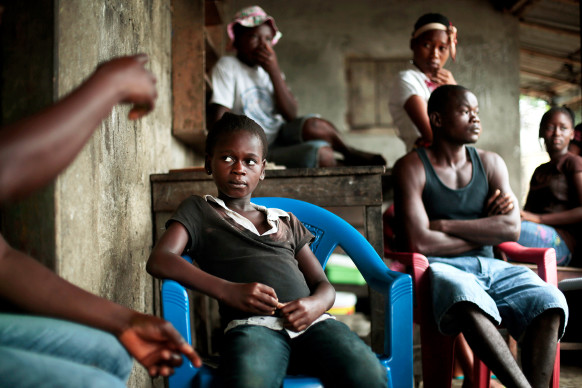You are here
SCIENCE by Katie M. Palmer Aug. 15, 2015
For the communities in Guinea, Sierra Leone, and Liberia where Ebola took the greatest toll last year, the worst is over. After claiming 11,000 lives, the fatal virus has finally begun to retreat. Numbers of new Ebola cases are dwindling. But for some of the survivors—the 50 percent or so of the infected who pull through—Ebola’s effects still linger.

Ebola survivor Fayiah, 11, sits with her relatives in Monrovia, Liberia. Jerome Delay/AP
For the communities in Guinea, Sierra Leone, and Liberia where Ebola took the greatest toll last year, the worst is over. After claiming 11,000 lives, the fatal virus has finally begun to retreat. Numbers of new Ebola cases are dwindling. But for some of the survivors—the 50 percent or so of the infected who pull through—Ebola’s effects still linger.
Thousands of Ebola survivors have resumed their regular lives, but many of them are still traumatized, struggling to process the horrors they’ve seen and rejoin societies that have shunned them. But the disease’s aftereffects aren’t just psychological. Many survivors are now returning to clinics complaining of mysterious symptoms: chronic headaches, debilitating joint pain, even eye problems that can progress to blindness. Some doctors in the region have begun calling the suite of problems “post-Ebola syndrome,” and they’re developing clinics devoted to caring for Ebola survivors.
But it’s not easy to treat a syndrome that has no definition.
Read complete story.
http://www.wired.com/2015/08/ebola-survivors-still-sufferand-doctors-dont-know/



Comments
Study of Ebola Survivors Opens in Liberia
Trial to examine long-term health effects of Ebola virus disease
nih.gov - June 17, 2015
The Liberia-U.S. clinical research partnership known as PREVAIL has launched a study of people in Liberia who have survived Ebola virus disease (EVD) within the past two years. The study investigators hope to better understand the long-term health consequences of EVD, determine if survivors develop immunity that will protect them from future Ebola infection, and assess whether previously EVD-infected individuals can transmit infection to close contacts and sexual partners. The study, sponsored by the Ministry of Health of Liberia and the National Institute of Allergy and Infectious Diseases (NIAID), part of the National Institutes of Health, will take place at various sites in Liberia and is expected to enroll approximately 7,500 people, including 1,500 people of any age who survived EVD and 6,000 of their close contacts.
(READ COMPLETE ARTICLE)
CLICK HERE - NIAID Role in Ebola and Marburg Research